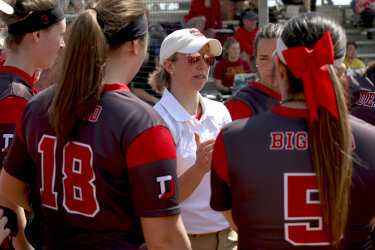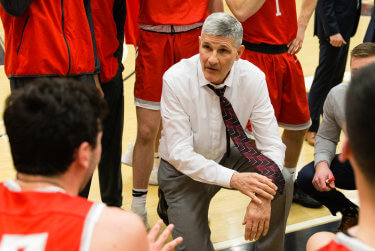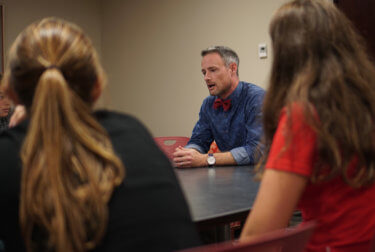(3 Minute Read)
There is a perpetual assumption in our society that something special takes place when a child or young adult is involved in sports. We have been conditioned to believe that mere participation will develop in our youth the virtues that we hold dear; crucial life skills and habits of the mind that can lead to a more successful life trajectory.

Tiffany Ozbun (Head Coach, Women’s Softball, Denison University)
Photo credit: Brett Dunbar, Curtis Ashcraft, Brandon Morgan – Denison Sports Network
Some have even claimed sport to be the last bastion remaining to mold our collective youth (Adams, 2015). And, for good reason – the educative potential of sport participation is seemingly unmatched in other aspects of society. Sport provides an often intense, emotive, and time-sensitive environment where athletes must work both individually and collectively in pursuit of excellence. As someone whose career has revolved around sport, and a father of two young boys who play sports, I care deeply about the notion of personal development through the sport experience. Yet time and again, research has indicated that simply playing sports does not develop character, life skills, or emotional and social competencies (e.g., Lott, 2018). I have observed as a coach and a scholar that as individuals participate in sport, they do not seem to grow psychologically and psychosocially in a positive manner.

Bob Ghiloni (Head Coach, Men’s Basketball, Denison University)
Photo credit: Brett Dunbar, Curtis Ashcraft, Brandon Morgan – Denison Sports Network
There are internal and external barriers to learning. Young men and women often lack self-awareness, perceived agency, recall ability, emotional understanding, or are simply unwilling to learn. Sometimes as coaches we do not create an environment that is conducive to learning nor are most of us equipped to facilitate a deep engagement between an athlete and a meaningful experience in a way to ensure that learning takes place. Nonetheless, athletes can experience incredible growth and maturation due to their involvement in sport. I have dedicated my career towards exploring how this process happens and how those of us in education can increase the likelihood of positive outcomes in our youth from such participation. I offer the following as a guide to help maximize the sport experience:

1) Teach Athletes to ‘Be Present’
Mindfulness training is great but if you lack the expertise or access to provide such training, simply having athletes spend one minute taking deep, full breaths are quite beneficial. Additionally, they need to practice paying attention to how their bodies feel, what is going on in their heads, and what emotions are strong and present.
2) Create Mental Models
Often I will work with Freshman athletes at the beginning of their season and have them think about a) what they can and want to learn, b) when opportunities suited for learning might present themselves, and c) specifically how they plan to take advantage of learning opportunities. When comparable situations materialize, they are ready.
3) Help Reconstruct their Experiences
Ask questions that are centered around learning, not judgment. Help link Emotions – Thoughts – Actions. Many techniques can work here such as using accountability partners (i.e. peers to offer feedback), reflective journaling, or film study. The key is to know that especially in times of high emotion, your athlete might not fully be cognizant of what transpired. If you can help them reconstruct what happened (in emotion, thought, and action), learning is much more likely to occur.
References
Lott. G. & Turner, B. A. (2018). Collegiate sport participation and student-athlete development through the lens of emotional intelligence. Journal of Amateur Sport, 4(3), 1-28.
Adams, S. (2015, May 11). The real importance of sport. Retrieved from https://www.youtube.com/watch?v=woR9b01N6mQ&t=112s

Great contribution Dr. Lott! Good advice to move us beyond participation to true development through sport. See also: Working Towards a Model of Reflection to Improve Athlete Development (ARCAA, 2018) ISBN 978-0-89641-580-5.
Very insightful points. As a college coach I try and instill the notion of being present and continually learning (even from days that it didn’t go well). Thank you for these insightful notes.